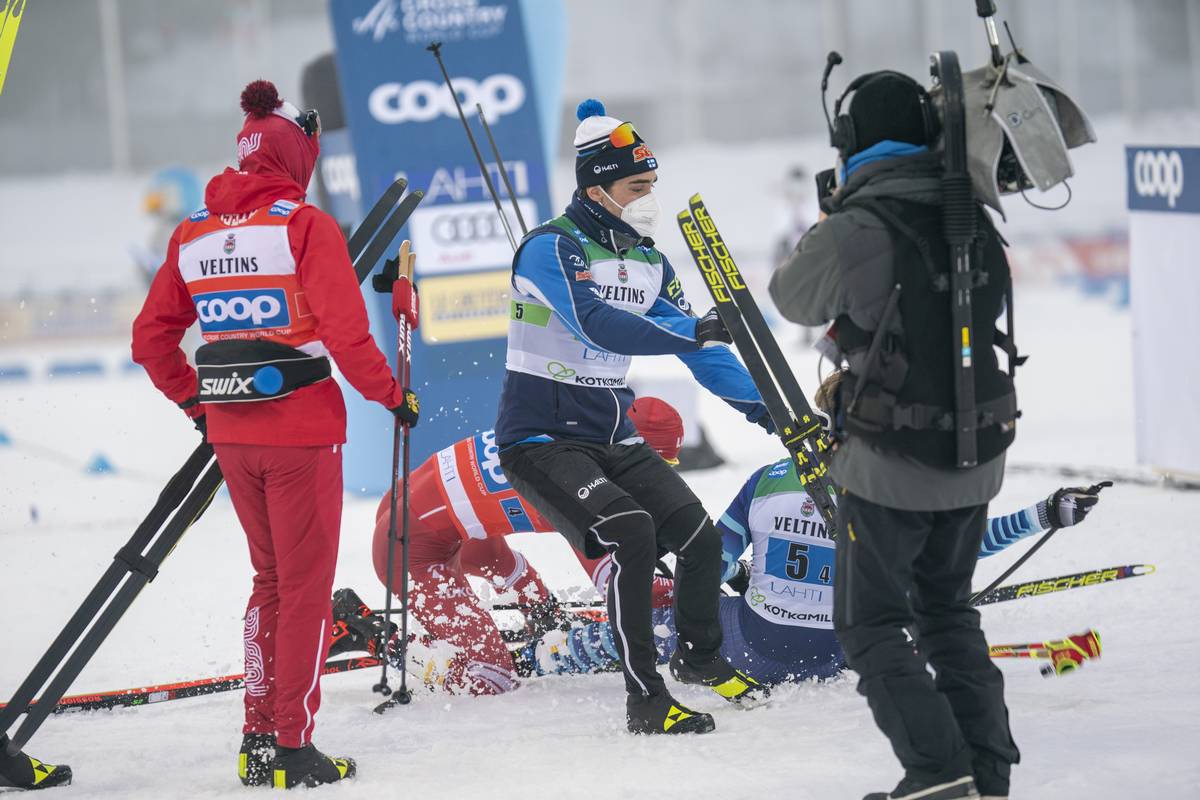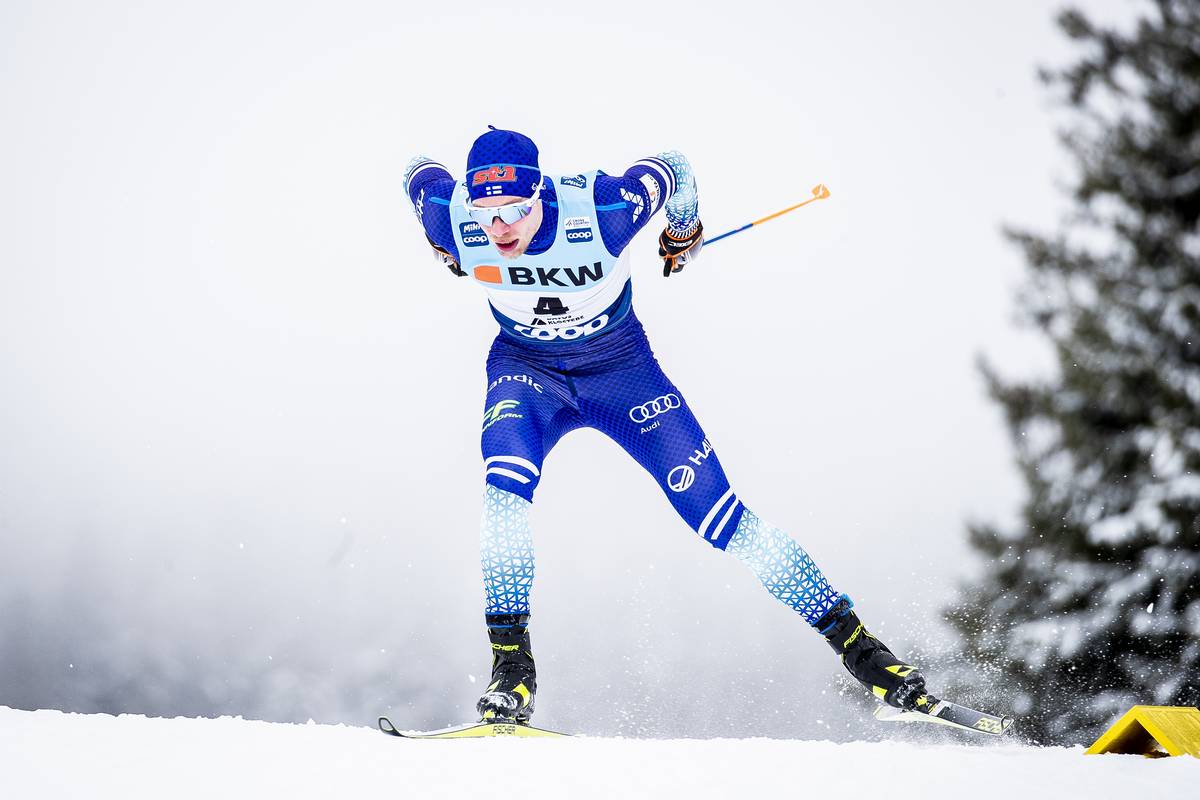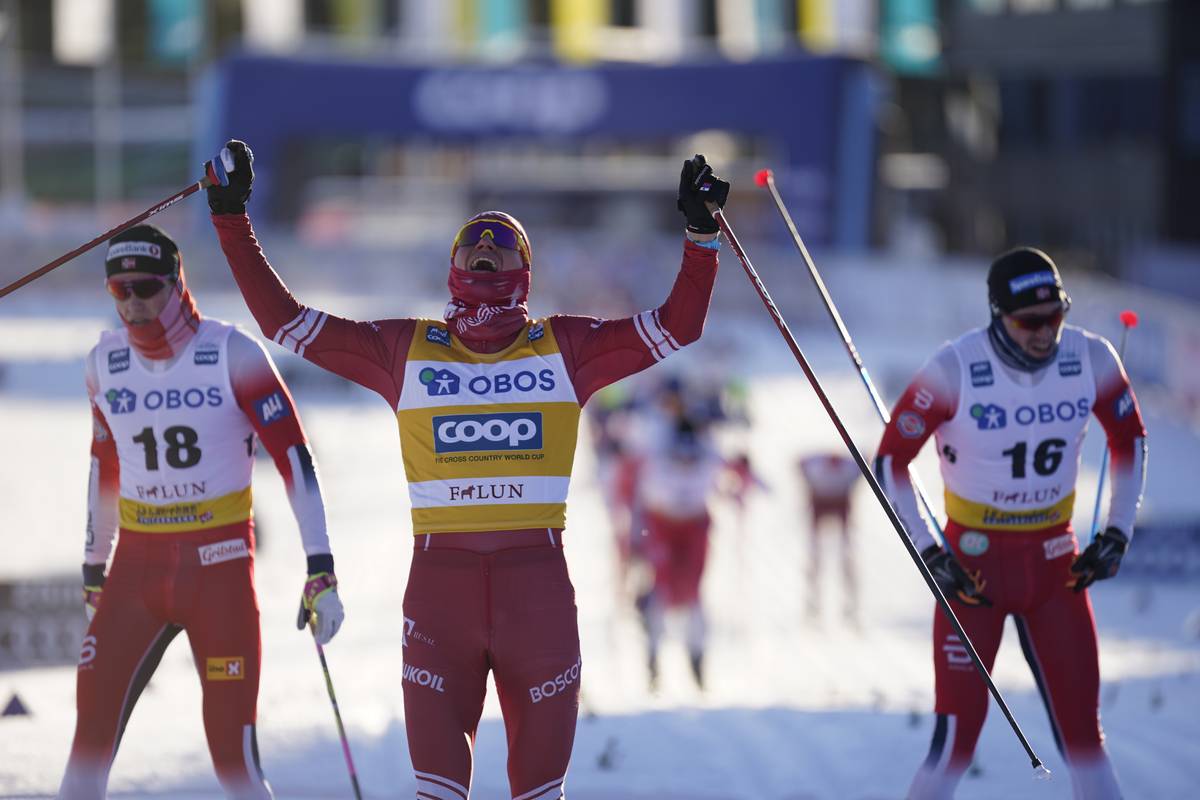
By Ella Hall and Jason Albert
So many moving parts when considering Alexander Bolshunov’s aggression towards Joni Mäki of Finland in the closing moments of the men’s 4 x 7.5-kilometer relay in Lahti on January 24. The finish line was in sight for the two skiers as Mäki came around the sweeping left-hand turn into the final straight ahead of Bolshunov. Mäki, it seemed, sensing Bolshunov making a move and advancing in the outermost right lane, carried momentum towards Bolshunov, and closed the door on the Russian’s progress. In a moment, Bolshunov became unglued. He swung a pole at Mäki, and after crossing the finish line, he barreled into the Finn, knocking him down.
After a short period, the competition jury reviewed the footage and disqualified Bolshunov’s relay team, Russia I. The aftermath of the incident was predictably muddy. Some said Mäki drifted, obstructing Boshunov. Others likened Mäki’s tactics to bike racing where closing sprints are often rife with aggressive position tactics.
We know this: the jury did not penalize Mäki, only Bolshunov.

The cries for a harsher and longer-lasting penalty for Bolshunov were loud on social media. One commenter on Facebook claimed Bolshunov needed an intervention. “Bolshunov should be taking anger management classes instead of winning World Cup races,” stated the post.
One response to that claim was equally terse: “Chill, and by the way, even if he will stop skiing and take crocheting classes – with his world standing he will win everything and wear his yellow bib regardless just deal with it.”
The next week, mum was the word from FIS. Bolshunov arrived in Falun, Sweden, and won the two distance races – a 15 k interval start skate, and a 15 k mass start classic. He contested Sunday’s sprint but finished 46th. He still leads the overall World Cup and represents the sport as the best all-around skier, wearing the yellow bib.
To get a closer look at the inner workings of FIS, we opened the cross-country rules tomb that is the FIS International Ski Competition Rules (ICR) Book II which was approved by the FIS Council in October 2020. It’s dense and arcane but historically has functioned adequately. In this case, Bolshunov was disqualified according to ICR rule 223.1.1 for unsportsmanlike behavior. (Now that you have the link, and find fault with Mäki’s move – you consider it obstruction- you can look to ICR rule 343.10 on “overtaking”).
The question became, with Bolshunov arriving in Falun, what other sanctions could FIS have handed down? Clearly, at least for the Falun weekend, Bolshunov was allowed to race.
Rule 223.3.2 states, “All competing competitors may be subject to the following additional penalties: – Disqualification – Impairment of their starting position – Forfeiture of prizes and benefits in favour of the organiser – Suspension from FIS events.” There it is, “Suspension from FIS events”.
But diving a bit deeper into the rules, ICR Rule 223.4 states: “A jury may impose the penalties provided in 223.3.1 and 223.3.2, however they may not impose a monetary fine of more than CHF 5’000.– or suspend a competitor beyond the FIS event at which the offence occurred.” The operative verbiage here being, “beyond the FIS event at which the offence occurred.” The competition jury in Lahti was not authorized to suspend Bolshunov in a manner that would impact his standing at another event – like Falun.
It’s worth mentioning that the skier in question, Bolshunov in this case, could be held back from competing by their national ski federation. The Russian Ski Federation did not penalize Bolshunov. They did, however, issue a public apology.
The press release stated: “On behalf of the Russian Ski Association, Alexander Bolshunov and Elena Vyalbe express their apologies for the reaction of Alexander towards Joni Mäki (FIN) during the men’s relay competition at the FIS Cross-Country World Cup in Lahti, Finland. Animosity is not a part of the spirit of Russian Team and we strongly value fair play in every aspect. Alexander Bolshunov therefore apologized to Joni Mäki and an official letter of apology was sent to the Finnish Ski Association by the Russian Ski Association. We sincerely hope that the dedication and hard work of all athletes, their performances as well as the beauty of Cross-Country skiing will return to focus and amaze many fans all around the world.”
Any further action regarding Bolshunov rests on FIS gatekeepers. According to FIS Cross-Country Race Director Pierre Mignery, FIS has several avenues for suspending an athlete. He pointed us towards the FIS statutes for clarity.
Mignery wrote, “suspensions can be given by the Appeals Commission, the FIS Council and the FIS Court (but not by competition juries as written above).”
Part V of the FIS Statutes deals with sanctions and appeals, which is where you can find the references Mignery cited. Under that sub-heading, Statute 55 states, “The following sanctions can be imposed … suspension for a period or a lifetime.”
Statute 56 illuminates “Responsibilities”. It puts forth what FIS entities are empowered to sanction and enforce those sanctions. Those were noted by Mignerny above and are spelled out in Statute 56 – they are the Appeals Commission, the FIS Council, and FIS Court.
Statute 56 also uses similar language to ICR rule 223.4 in stating, “The competition juries can express warnings, start prohibition, changes of the starting order, disqualification, removal or refusal of accreditation, fines to a maximum amount of CHF 5’000 (Five Thousand Swiss Francs) and suspension from the event at which the offence occurred.”

For now, Bolshunov is free to race as if it’s business as usual, which is most often race-win fast. He leads the overall by a whopping 839 points over second place, Ivan Yakimushkin of Russia. If in fact Bolshunov is sanctioned further by FIS, an appeals process and specific procedures are described in FIS Statutes 57 and 58.
Learned on background, FasterSkier understands the Bolshunov incident continues to be discussed by FIS.
Ella Hall
Growing up in Washington’s Methow Valley, Ella was immersed in skiing and the ski community from a young age. From early days bundled in the pulk, to learning to ski as soon as she could walk, to junior racing, a few seasons of collegiate racing, and then to coaching, she has experienced the ski world in many forms. Now, as a recent graduate from Dartmouth College, she finds herself living in France splitting her time between teaching English at a university in Lyon, avidly following ski racing (and now writing about it!) and adventuring in the outdoors as often as possible.



